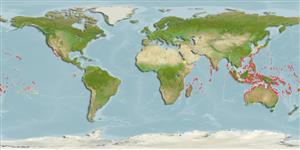>
Blenniiformes (Blennies) >
Tripterygiidae (Triplefin blennies) > Tripterygiinae
Etymology: Helcogramma: Greek, helkos, -eos, -ous = ulcer, sore + Greek, gramma = letter, mark (Ref. 45335).
More on author: Herre.
Environment: milieu / climate zone / depth range / distribution range
ນິເວດວິທະຍາ
ສັດທະເລ ອາໄສຢູ່ໃກ້ໜ້າດິນໃຕ້ພື້ນທ້ອງນ້ຳ; ລະດັບຄວາມເລິກ 2 - 10 m (Ref. 6211), usually 2 - 5 m (Ref. 48636). Tropical
Indo-Pacific: widely distributed. The species complex is being revised by J.T. Williams.
ຂະໜາດ / ນ້ຳໜັກ / Age
Maturity: Lm ? range ? - ? cm
Max length : 5.7 cm SL ຕົວຜູ້/ບໍ່ມີເພດ; (Ref. 6211)
ຄີ (ໜາມ)ແຂງຢູ່ຫຼັງປາ (ທັງໝົດ) : 16; ຄີຫຼັງຂອງປາ (ຄີອ່ອນ) (ທັງໝົດ) : 9 - 10; ຄີ(ໜາມ) ແຂງຢູ່ຄີກົ້ນປາ
ກຸ່ມປາກະດູກແຂງ
ຄວາມຖີ່ຂອງກຸ່ມຖ່າຍທອດພັນ
ປາທີ່ມີການເຄື່ອນຍ້າຍຈາກທະເລໄປຫານ້ຳຈືດ ແລະນ້ຳຈືດຫາທະເລ
ປາທີ່ມີການເຄື່ອນຍ້າຍຈາກທະເລແລະໄປໄຂ່ຢູ່ນ້ຳຈືດ
ຄີກົ້ນຂອງປາ
ສັດທີ່ມີກະດູກສັນຫັຼງ
ການຖ່າຍທອດທາງກຳມະພັນຈາກພໍ່ແມ່ຫາລູກ: 1; ຄີກົ້ນຂອງປາ: 18 - 20; ສັດທີ່ມີກະດູກສັນຫຼັງ: 34 - 35. Diagnosis: Dorsal fin III + XIII+ 9-10, second fin same height of first; anal fin I + 18; pectoral rays 16 (1+8+7); pelvic fin I, 2, spine short and hidden, segmented rays simple, partially united by membrane. Vertebrae 10 + 24-25. LL total lateral scales 36-38, pored series 33-37 (21) scales; nape, belly, and anal-fin base scaleless, caudal fin base with only 1 row of scales. Mandibular pores 5-7+3-5+5-7. Orbital cirrus flat and palmate. Head length 3.5 in SL; eye 2.8; maxilla 2.3 in HL. Male head dark brown on top, reddish above eye, black and blue below, with narrow stripe from maxilla to preopercle; body brownish grey with 3 pale saddles; belly pink. Female head white with red and brown spots below, shading darker and with brown blotches above, with brown stripe from upper lip to corner of eye; body white with brown oblique semi-bars and blotches on dorsal half of side (Ref. 75031). Males distinctly colored during courtship, but look drab at other times (Ref. 48636).
Adults inhabit rocky boulders from depths of 2 to 5 m, common at depths less than 10 m (Ref. 6211). They live in small groups, each comprising a male and several females (Ref. 48636) on rock surfaces and under ledges and tidepools (Ref. 75031). Eggs are hemispherical and covered with numerous sticky threads that anchor them in the algae on the nesting sites (Ref. 240). Larvae are planktonic which occur primarily in shallow, nearshore waters (Ref. 94114).
Life cycle and mating behavior
Maturities | ການສືບພັນ | Spawnings | Egg(s) | Fecundities | ຕົວອ່ອນ
Hansen, P.E.H., 1986. Revision of the tripterygiid fish genus Helcogramma, including descriptions of four new species. Bull. Mar. Sci. 38(2):313-354. (Ref. 6211)
IUCN Red List Status (Ref. 130435)
Threat to humans
Harmless
Human uses
ເຄື່ອງມື
Special reports
Download XML
ແຫຼ່ງອີນເຕີເນັດ
Estimates based on models
Preferred temperature (Ref.
123201): 24.7 - 29.3, mean 28.3 °C (based on 3300 cells).
Phylogenetic diversity index (Ref.
82804): PD
50 = 0.5000 [Uniqueness, from 0.5 = low to 2.0 = high].
Bayesian length-weight: a=0.00562 (0.00258 - 0.01228), b=3.08 (2.89 - 3.27), in cm total length, based on LWR estimates for this (Sub)family-body shape (Ref.
93245).
ຊັ້ນເຂດຮ້ອນ (Ref.
69278): 3.1 ±0.3 se; based on size and trophs of closest relatives
ຄວາມຢືດຢຸ່ນ (Ref.
120179): ສູງ, ປະຊາກອນຕຳ່ສຸດທີ່ໃຊ້ເວລາສອງໜ້ອຍກວ່າ 15 ເດືອນ (Preliminary K or Fecundity.).
Fishing Vulnerability (Ref.
59153): Low vulnerability (10 of 100).
